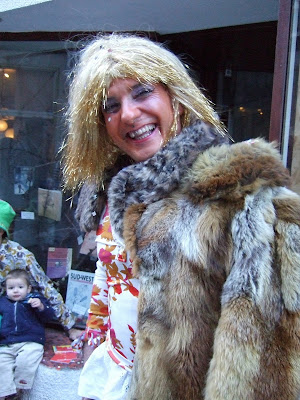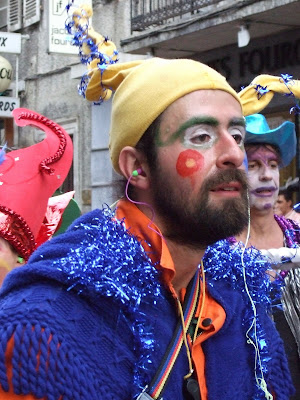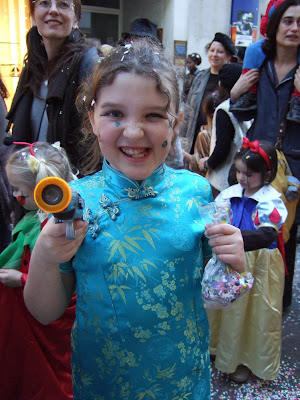Postcards from Pau
 Map from Wikipedia
Map from WikipediaThis weekend Marty and I spent a lovely spring day in the town of Pau enjoying its spectacular view of the Pyrénées and its festive Carnival celebration. The Carnival parade, with its elaborate and colorful costumes and riotous music, was the most fun parade I have ever seen. It seemed like the entire town showed up in costume for this family-friendly event. Knowing you all would have enjoyed being there, I took some pictures of the parade for you (below).
Pau’s most famous son is King Henri IV, France’s most popular king who was born in Pau in 1533. He was an unusual king in that he actually demonstrated concern for his subjects and is famous for having said something to the effect that everyone in his kingdom should be able to afford a chicken in their pot at least every Sunday. Raised a Protestant, he converted to Catholicism in order to secure his throne and is said to have quipped that “Paris is well worth a mass.” He didn’t forget his Protestant roots, however, and issued the Edict of Nantes to secure Protestant rights in this otherwise Catholic country. His message of religious tolerance was truly radical in its day.The Carnival King of Pau, "Sent Pancard" (Fat Belly), however, is slightly less respectable than King Henri IV as he represents all the flaws and calamities of the world. Each year he returns to Pau during Carnival to attempt to recapture his throne. During a tribunal at the end of the Carnival parade Sent Pancard was condemned to burn. The tribunal was actually conducted in Occitan, a language that was widely spoken in regions of southern France, Monaco, Spain and Italy.
Occitan is known as Langue d'oc because the word “yes” in Occitan is “oc.” In contrast, the Langue d’oϊl, were a group of languages spoken in northern France that used the word “oϊl” for “yes.” The word “oϊl” eventually changed to “oui” in French, which is the best known of Oϊl languages. The use of Occitan declined precipitously, particularly after the French Revolution when local languages were viewed as a threat to the French Republic. Until the beginning of the 20th century there were many local languages, like Occitan, spoken in France. It is estimated that as few as half a million people in France speak Occitan today.
Interestingly, the street signs in the central part of Toulouse are in both French and Occitan. Evelyn, my somewhat cynical French teacher, says this is for the benefit of tourists. I must confess that until today when I was looking up information on Occitan, I had assumed that these street signs were in Spanish. Similarly, while listening to the tribunal of Sent Pancard after the Carnival parade (before reading the carnival brochure that explained that the proceedings were in Occitan) I naively asked Marty why they were conducting the tribunal in Italian. The more generous among you may concede that Occitan, being a Romance language, could quite reasonably be confused with Spanish and Italian, but I suspect that mostly I have proved (once again) that there are many ways to be a dumb foreigner.
The King, Sent Pancard (Fat Belly)














































3 Comments:
I love your photos. The colors are so vibrant. Sounds like a great Carnival. BTW, I found Waldo!
Great photos. I found waldo. Pretty fussy look.
Wonderful pictures, I can almost hear the crowd!
Post a Comment
<< Home